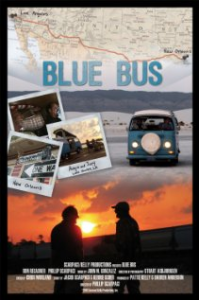By: debbie lynn elias

BLUE BUS is a charming little effort that feels like a Hewell Houser travelogue across the I-10 from Los Angeles to New Orleans. Told in buddy picture-road movie format, BLUE BUS is the story of 68 year old August “Augie” Dupree and his friend Joseph Mafe. As different as night and day and living in Los Angeles, Augie is a loner filled with unfulfilled dreams of what his life would have been like when he left New Orleans at age 19. Joseph is boisterous, gregarious and outgoing but always giving a sense that his over-the-top persona is masking a lost boy hidden deep inside. Life for the pair takes an unexpected turn when Augie wakes up to find a 1968 blue VW bus in his driveway. Inside the bus is a sealed box with a note from his lifelong best friend who has now passed on. The bus was his and there was a time it carried his dream and that of Augie to drive cross country and see America. That journey never came to pass. Life got in the way. And now death. But itfs up to Augie to finally make that dream a reality and drive the BLUE BUS and the box back to their childhood home in New Orleans. And he convinces Joseph to come along for the ride. With picturesque little side trips along the journey, director Phil Scarpaci delivers some beautiful panoramic vistas of the desert southwest of the United States culminating in a metaphorically and visually vibrant, lively and colorful stop in New Orleans.
As Joseph, Phil Scarpaci himself is as exuberant himself as Houser is in his little travelogue show. Scarpacifs blustering macho bravado is fun, entertaining and believable. Unfortunately, much of Scarpacifs heightened enthusiasm feels forced in an effort to compensate for the lackluster, ill-paced and halting deer-in-headlights performance by Ron Recasner. While the plot line of August wanting to fulfill a lifelong dream of his deceased friend and sets the wheels of the BLUE BUS in motion, Recasner merely idles, never even getting into drive. He looks and acts as if lost in a time warp. The imbalance between the two actors leads to an uncomfortable viewing experience. Having said that, however, the montages of bonding and laughter within the BLUE BUS, overall feel more organic and less forced.
Written by Recasner, Jacob Scarpaci and Kerrie Scher, the premise is believable and one which will resonate with many – a buddy road picture fulfilling the childhood dreams of best friends while creating new dreams and memories with a new best friend. I suspect that BLUE BUS may inspire many viewers to embark on a journey such as Augie and Joe “before itfs too late.” Puttering along at a leisurely pace, we learn much about the characters as the empty miles and hours pass. A nice touch, time is measured by how many cookies get eaten in the huge Tupperware tub of fresh baked goodness provided by a lady friend of Joefs. Where the film really comes together and packs an emotional wallop is the final act with Augie sitting on the stoop of his childhood home recalling the pictures in his head of his mother, grandmother and aunts. You feel transported and “in the moment” with him. You are on the sidewalk playing with him, bouncing a ball across the street, listening to the baseball game on the radio while mom and grandmom do the ironing. Priceless. Scarpacifs silence at that moment is tender and respectful. But, again, Recasner drags the scene down with an uncomfortable false smile and laugh on opening the box and finding Mardi Gras beads and a crystal bottle of Pinch. Up until this moment, Joseph, Augie, the audience, everyone is anticipating that an urn of ashes is in the sealed box. One would think the surprise of not finding ashes to warrant a much stronger and more elated reaction than what Recasner provides.
Directed by Phil Scarpaci, visually, the panoramic lensing across the US is stunning. Crystal clear. Sharp. Defined. But the interior shots in the BLUE BUS are muddled and have the look of a local cable tv show of the 70’s. A disjointed and distracting contrast. But for the beauty and clarity of the exteriors, given the intimacy of the buddy portion of the journey, BLUE BUS could very easily be beautifully adapted to the stage. Chris Worland works magic with the editing, giving it a feel of paralleling the speedometer of the BLUE BUS – at times surprisingly accelerating and for the most part, meandering along below the speed limit. A nice metaphoric contrast with the personalities of Joe and Augie. Glorious is the vibrancy of color and energy of New Orleans which, used to its fullest advantage, is a tonal and emotional reflection leading to a clarity of the ultimate message. From death, there comes life.
Augie – Ron Recasner
Joe – Phil Scarpaci
Directed by Phil Scarpaci. Written by Recasner, Jacob Scarpaci and Kerrie Scher.












